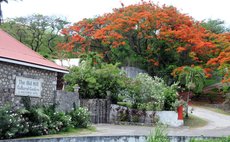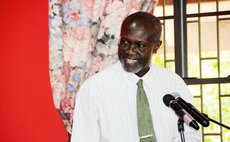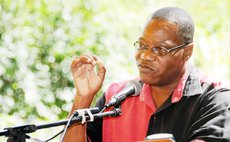Calypso lovers review 2013 season
Kudos to the Dominica Calypso Association for organising a review of the 2013 season and for inviting the public to share their sentiments and make suggestion aimed at improving the art -form. The activity was held at the UWI Open Campus and was chaired by the association's executive secretary, Daryl Bobb. Remarks were presented by President Ras Kelly and the main feature was a forty-minute presentation which mainly focused on calypso judging and integrity in the art by Dr Francis Severin, a regional director of the UWI Open Campus ,using the Hunter reading palm fiasco as his theme in what I thought was a rather lengthy but instructive lecture.
The review or consultation with the public was the first in a decade and brought together a fine mix of Calypso enthusiasts of varying interests and professions: doctors, judges, calypsonians, teachers, principals, lawyers, media, politicians, medical personnel, entrepreneurs, musicians and, generally, lovers of Calypso.
The views generated by the lively discussion from the full house were as follows:
There should be pre- eliminations because 60 and more calypsonians are too many to be judged in one night.
Voice quality should be eliminated from the judging criteria since it is God- given and puts blessed individuals at a 5-point advantage even before they perform.
The association should pay a team of score-writers to facilitate calypsonians particularly for the eliminations to save time at rehearsals.
The criteria "melody" should be broadened to "music" since it was felt that melody is just one aspect of music.
Eliminations should be completed in the tents and all calypsonians, except the defending monarch, should start from the annual eliminations.
The judging pool should be extended and more workshops held to facilitate that process.
The high standards of calypso should be exposed and marketed to various parts of the region particularly the talent and feat of monarch King Dice.
Calypsonians competing for road march should be allowed to sing their song on the road even if this personal involvement is not tallied.
There should be a way to eliminate judges who prove to be incompetent or blatantly inconsistent due to political or other biases.
There should be consistency in the criterion used in judging the senior as well as the junior Monarch competitions; greater financial and technical assistance should be given to junior calypsonians.
There were concerns over the fees paid to the DFC (Approx. $ 5-6,000 per hour) for rental of Festival City.
Presentation in calypso should be made more important and the various categories, as is done in the Queen Show, should be recognized and awarded prizes (i.e. presentation, song-writing, musical arrangements).
There should be separate judges for lyrics, melody, presentation, and rendition.
The Association needs to be more proactive since the same issues surface every year; hence, a code of ethics should be adopted.
There is too much focus on political and intellectual commentary in the judgment of the competition and more light-hearted and fun songs could find their way into the finals such as "Rum and de Party" and "Illegal calypso King."
The calypso Finals shows should be held on Sundays to allow patrons to go straight into Jouvert.
The queen contestants receive $10,000 per participant from sponsors from the private sector while calypsonians expended much more for their show and received very little individual support, except from the telecommunications and beer companies who sponsor of the shows annually.
The president, and by extension the executive, should not participate in the competitions because it is a conflict of interest.
Even after the three-hour discussion, there were other issues mentioned in the meeting but not officially raised by participants such as: The failure of the DCA executive to hold elections over the past three years in keeping with the theme of integrity and accountability highlighted by Dr. Severin in his opening presentation. The under- utilization of the Calypso House. Marketing of Calypso Defining a Calypso.
The DCA promised to hold these discussions as an on-going activity where stakeholders can interface with the executive.
In response, the DCA president addressed some of pertinent issues. He revealed that Sundays have been tried for staging the Calypso Finals but it did not work out because most places are closed, unlike other countries such as St Lucia and Antigua, during the last three days of carnival, making inevitable last minute preparations impossible. Again it is difficult to implement such changes because they do not fit in with Dominican culture.
Because of the unique formation and structure of the DCA which represents calypsonians but also hosts and prepare their own show, just as NC, King Shaky, Black Star liner and others, it was felt that if executive members could partake in shows that they organized, the argument of conflict of interest did not stand. It was also pointed out that judges whose activities are coordinated by the judges' coordinator are totally independent of the executive.
Having cleared this, Bobb and Kelly counter -argued the position that calypsonians did not have access to their score sheets saying it was open and all had a right to do so. Kelly was adamant that he indeed had a right so to do, even as the president of the Association, while criticising the scores he received in the finals. A judge responded that "the chickens had come home to roost" since the president never criticized judges.
One calypsonian suggested that the judges should meet with them to answer pertinent questions related to their positions and weaknesses. There was some discussion on whether judges should be revealed by name and be exposed to scrutiny.
About experimenting with having separate judges for various categories, as obtains in TNT, the DCA said it has been proven to be disastrous about two decades ago. Calypso being an all-inclusive art, it is difficult to judge it as one would judge a queen show; also, the resources and expertise for all these fields are not readily available. "Those who are willing are not able, and those who are able, are not willing."
As far as points for quality of voice was concerned, it was suggested that one should encourage calypsonian to train their voices but it was also argued that some have it while others just don't. TNT's Shadow, reigning Monarch Pink Panther and even Dominica's NC were examples of calypsonians who were successful with poor vocal quality.
Finally, I present this article in memory of the late Ferdinand Frampton who passed just about an hour before the symposium began; and also for his daughter Ferdina who served for well over a decade as judges' coordinator for the Dominica Calypso Association.




